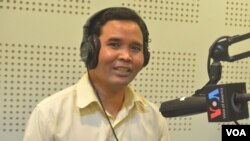The Cambodian government must stop protecting groups accused of illegal logging and stop issuing licenses for land concessions that facilitate the crime, Ouch Leng, head of the Cambodian Human Rights Task Force, says.
“The forest in Cambodia is gradually declining because the government gives the economic concession license to private companies,” he told “Hello VOA” Tuesday. “This is the main reason we have a forest catastrophe in Cambodia from one year to another.”
Forest protection laws are not enforced, he said, adding to the problem.
Only about 20 to 30 percent of Cambodia’s forest cover remains. Huge swaths, such as those along the Cambodian-Thai border, particularly in Preah Vihear province, are gone. In Ratanakkiri province’s national park, only about 30 percent of cover remains. And in Kratie province’s Snuol district, forests meant as wildlife preserves are nearly all gone.
“Based on my organization’s research, even as the forest is more destroyed, the demand of the government for international markets, like China, is higher,” he said. “The forest has an important role in protecting the environmental systems, as well as to protect people’s lives.”
Cambodia is meanwhile experiencing ongoing climate change, he said, with more flooding and droughts, and higher deaths, including from increased lightning strikes. “No one can prevent it, rich or poor,” he said. But the forest can be protected.
Ouch Leng repeated allegations that the Try Pheap Group, headed by a powerful business tycoon, continues illegal logging unabated. The environmental watchdog Global Witness recently issued a report on the group, accusing it of widespread illegal logging and deforestation.
Agriculture Minister Ouk Rabun has denied the allegations of Global Witness, saying the group does not understand Cambodian timber export procedures.
Indicative of a more widespread problem, the government continues to issue licenses to the group for economic land concessions, which leads to more deforestation, despite the company’s cause of “serious destruction of the forest,” Ouch Leng said. Meanwhile, tens of thousands of hectares of forest are lost each month.
Cambodia is at risk of becoming a country run by companies, not people, he said. “And those companies can do whatever they want, arbitrarily, and can load timber into Phnom Penh in full daylight, and no one will prevent this, or prohibit them at all.”







